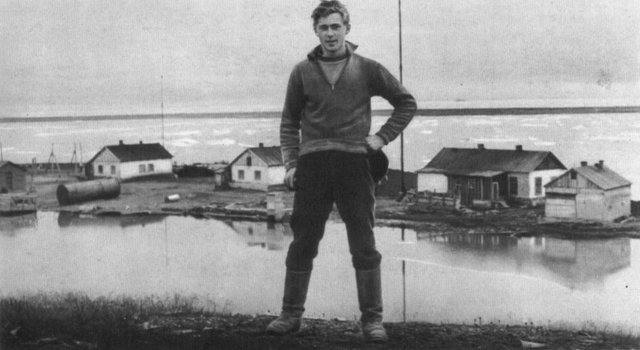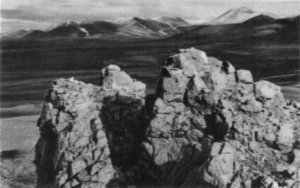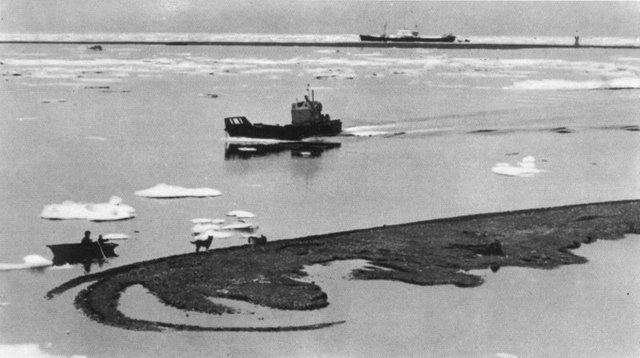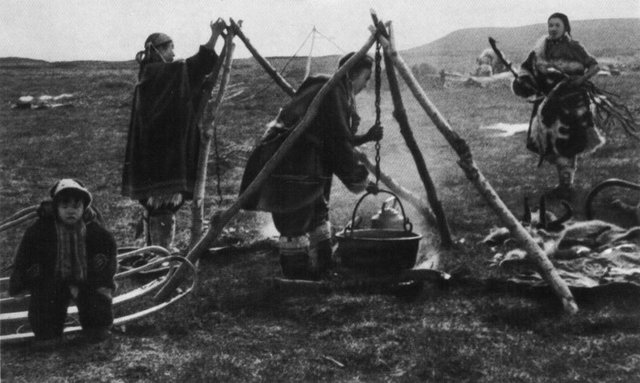Wrangel Island (featuring Vasily Peskov as author)
To begin with, General Wrangel of ill-fame is in no way connected with Wrangel Island, which was named after the Russian explorer Ferdinand Wrangel. Early in the 19th century the Russian government appointed twenty-four-year-old Lieutenant Wrangel head of an expedition whose aim was to check the information that there was land to the north of the Chukotka Peninsula. For four consecutive years Wrangel's expedition set out across the ice fields only to return again and again, for the bitter Arctic cold and the hummocky ice made the going impossible for both men and dogs. Still, Wrangel went back to St. Petersburg convinced that there was land to the north. Indirectly, from Chukchi legends and stories the Chukchi people told him, he was able to predict its exact location.
For many years after no ships could reach the forbidding area. Then, in 1867, an American whaler, T. Long, sailed within thirty-five kilometers of an island whose location coincided with that predicted by the Russian lieutenant. Long considered it only just to name the island after Wrangel.

Sergei Kiznertsov, an 18-year-old veteran islander, is a reindeer breeder.
Your first step upon the crunching pebbles or soft grass of an unknown land is always momentous. Six huge walruses flopping into the water from an ice floe were our welcoming committee at Wrangel Island. Two snowy owls perched on the high rocks watched unblinkingly us as we disembarked. A dull brown expanse sloped upwards from the water and then skyrocketed into purple and dazzlingly blue cliffs. The mountain range was belted by a smoky strip of fog. The stillness was overwhelming. Suddenly, we saw a man running towards us and from this great distance could hear the rocks clattering under his feet.

A cold, forbidding island.
The entire island is made of rock. There are round boulders polished by the sea and flat slabs of dun-colored rock that resemble shale. Certainly they made the early explorers exclaim that the island contained tremendous deposits of coal. Higher up in the mountains the rocks appear as gray, purple or brick-red monoliths. On a clear day the colors, intensified by the sun, impart a truly majestic, royal grandeur to the mountains.
What is life like here? There is hardly a trace of human activity save the tracks of a land rover leading off in various directions and a gallery in one of the mountains where a group of Americans mined rock crystal in times past.
In the mountainous interior of the island you feel you are on some distant planet, for all that meets the eye here are the hills of rock, the cliffs and dead water in the half-dry streams. There are no fish, no bugs or other creatures in these streams fed by meltwater. Nothing in the landscape but the blue sky and the white owl on the knoll remind you that this is your own planet Earth, after all. I am sure that everyone who has been here has experienced this uneasiness. Even the name places on the map of the island reflect the anxiety of the first explorers: Treachery Bay, Doubtful Harbor, Unknown River, Sudden River, Point Beasts of Prey, Misty Mountain and Two-Headed Mountain.
Our land rover splashed through pools of clear water and clambered over great fields of rocks. Suddenly the driver stopped and jumped down. He pulled a curved log from the water. It was a cracked and yellowed mammoth tusk! However, I did not notice a trace of surprise on the faces of my fellow travellers and was told such finds are not unusual on the island.

When flying over the Arctic Ocean all you see is ice. But there is life here. You may spot a polar bear or rookery, where seals congregate on an ice floe like this.
This feeling of deserted wasteland is dispelled as soon as one descends to the foothills and the plain. A skinny, mottled polar fox watched intently as we jounced across a rocky ford. Some birds were flying low over the tundra. A bumblebee zoomed in through the open window. When we stopped by a tiny stream to stretch our legs I became convinced that life here was a party for bumblebees: the ground was covered with a veritable blanket of flowers. They were all very small, but there was such a great variety of blue, red, orange and purple blossoms. The many mosses and lichens were just as varied. Short-stemmed poppies and reddish clumps of wild sorrel were sprinkled about. There were low willow thickets growing along the banks of the stream, so low that at first I thought it was tall grass.
We drove back to the beach and headed towards a lone light. Two bearded botanists from Leningrad were sitting by a campfire. They had camped here in a tent for eight weeks, collecting specimens for their herbarium. I jotted down the following: "There are 200 varieties of flowers on the island and 100 other types of vegetation." This is really amazing if we recall that there is still frost here in summer and no soil as we know it, nothing but rocks.
As we bid the botanists farewell we mentioned the white patches on the mountain. "Is that snow?" I asked.
"No, geese."
We took off our fur hats to hear the birds communing softly with each other in the dusk.
This was the time of year when the white geese known hereabouts as Canada geese were getting ready to migrate. We often see migrating birds, but these were just getting ready to fly south. The young birds still had to develop strength in their wings and so the old geese would take the flocks up on frequent trial flights along the coast. Sometimes they would come down to rest. On one such occasion we set out picture-hunting. I hid in a dell while the land rover circled. The flock took to the air. I was dazed by the flapping avalanche of snow-white wings edged with black.
Thousands of birds spend the summer on Wrangel Island. Geese are quite helpless during the nesting period and especially when they are moulting. At this time they can be herded into enclosures with a twig, much like sheep. This is exactly how they are caught for zoos or for food. People on this distant island who have so little of life's pleasures find it difficult to resist the temptation. However, the local population is growing steadily, and if there are no strict laws to stop them, the geese will eventually become extinct. There was probably a time when white geese nested all along the northern coastline. Now this distant island, and only because it is unaccessible to man, sustains the flocks. They head for it unerringly, though it is lost in the icy wastes beyond the Arctic Circle. The geese fly over the island to their nesting grounds along a once-established course, over the pass between two mountains. The number of empty cartridges that cover the ground here once again raises the question of the future of these white birds.
While flying in an ice-scouting plane to the north of the Chukotka Peninsula, we spotted a polar bear. The yellowish beast was swimming through the ice floes towards Wrangel Island, which has for centuries served this species as a maternity home. Late in August or in September, having ended their wanderings in the ocean, the females come to the island. After a short period on the island the animal hollows out a chamber in the snow in which to bring forth her young.
In the 1930s the first teams of winterers on Wrangel Island would shoot up to seventy polar bears in a season. Such hunting is practically devoid of risk. Perhaps, to counteract the feeling of having an unfair advantage over the beast, man would look for danger. This is what one of the first winterers recalled :
"Whenever Zvantsev's first shot just wounded a bear and it would head back into its lair, he would lay his gun on the snow, pull out his Colt, cock it and crawl right in behind the crazed and wounded beast. But the female was not only wounded, she was defending her cubs and was therefore twice as vicious. Zvantsev would crawl through the blue gloom of the chamber, Colt in hand. When the animal saw it was trapped it would lunge at him. Then he would fire point-blank. He must have shot a dozen bears that way."
The risk was indeed senseless. Yet, there was so much senseless shooting in the Arctic regions in those days, shooting that involved no risk whatsoever! Polar bears were shot from the decks of passing ships, and more often than not the quarry was left on the snow. The bear had been killed for pleasure and in order that someone might say: "I shot a polar bear." According to the latest count, there are not more than five thousand polar bears left in the Arctic. As before, Wrangel Island serves as one of the main breeding grounds. Naturally, the presence of human beings frightens the animals, yet a primeval instinct draws the pregnant females here each autumn. Hunting polar bears has now been prohibited. At times a game warden might search for a lair in order to pick up a cub for one of the many zoos which clamor for them. I missed the island's game warden by two days. He had flown to Moscow with a cargo of several polar bear cubs, snowy owls, foxes and geese.
Man has not been on Wrangel Island very long. In 1916 it was proclaimed Russian territory. In the early 1920s, taking advantage of the fact that the young Soviet Republic had more important affairs to attend to on the mainland, Canada and, later, the United States, attempted to colonize the island.
A Soviet gunboat which arrived to restore the Soviet rights to the island found a party of trappers here.
The story of the first settlers is very interesting. All during the flight to the Chukotka I was engrossed in Mineyev's book Five Years on Wrangel Island. He had lived on the island for five long years! Three years were spent there according to plan and two more because no ship could break through the ice packs to take the men off the island. Mineyev was in charge of the party of winterers. His account of those dramatic five years is fascinating. I believe he is still alive, for I recall having heard an elderly voice on one of the broadcasts for the Far North and the announcer then saying, "You have just heard a report by the polar explorer Mineyev." I believe that Zvantsev is also alive, the very same one who crawled into the bears' lairs. He was one of Mineyev's party.

A ship can only drop anchor here once a year, in the middle of August.
There are two settlements on the island now, one at Somnitelnaya (Doubtful) Harbor and one at Rodgers Harbor. Ships can always reach the island during the months of navigation, for planes guide them through the ice. Thus, the two hundred inhabitants of Wrangel land are supplied with all the necessities of life. There are Russians, Chukchi, Eskimos and Ossets living here. The island is an important meteorological outpost. However, reindeer-breeding and trapping are the main occupations. There were no reindeer on the island before the first ten animals were brought here by boat from the Chukotka Peninsula after the war. The herd now numbers five thousand head. It is an unusual herd, neither wild nor domesticated. It grazes untended in the valleys until autumn, when the time for slaughtering comes. Then the shepherds set out to search for it. I noticed that these reindeer were twice the size of those on the Chukotka.
"That's because they have good pasturage here and there are no midges. And no wolves. The reindeer have a good life here," an old Chukchi told me.
The island's trappers hunt polar foxes and walrus, which appear near the shores late in autumn. The hunters set out on scouting expeditions every day, steering their tiny walrus-hide boats through the floes.

On the shore, a bit to the south, you may see smoke. This will either be a lone hunter, some shepherds and a reindeer herd or a geologists' campsite. Though you rarely come upon human habitation, people do live here.
Meanwhile, the geese were getting ready to migrate to Canada. One morning it began to snow. This was the signal they had been waiting for. The flocks took to the air. Long lines of birds winged over the shore, flying over the settlement with anxious cries. The geese that had been penned in summer began honking loudly at the sound of the flocks overhead. People came out of the houses and stood bareheaded in the cold, watching silently as the white birds flashed across the snow-flecked sky. In the course of a week the island became deserted. Two steamers in the harbor called to each other in low voices as they unloaded provisions and coal. The long polar night was just around the corner.
I missed your photos and stories
Congratulations @peskov! You have received a personal award!
Click on the badge to view your own Board of Honor on SteemitBoard.
For more information about this award, click here
Hi my brother
Teach me to use better esteem and useful
In order to get more votes like you.
Thank you
Congratulations @peskov! You have completed the following achievement on Steemit and have been rewarded with new badge(s) :
Click on the badge to view your Board of Honor.
If you no longer want to receive notifications, reply to this comment with the word
STOPDo not miss the last post from @steemitboard:
SteemFest³ - SteemitBoard support the Travel Reimbursement Fund.
Congratulations @peskov! You have completed the following achievement on the Steem blockchain and have been rewarded with new badge(s) :
Click here to view your Board of Honor
If you no longer want to receive notifications, reply to this comment with the word
STOPDo not miss the last post from @steemitboard:
Congratulations @peskov! You received a personal award!
You can view your badges on your Steem Board and compare to others on the Steem Ranking
Vote for @Steemitboard as a witness to get one more award and increased upvotes!